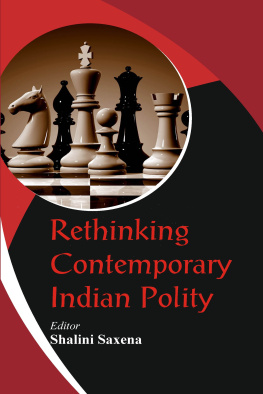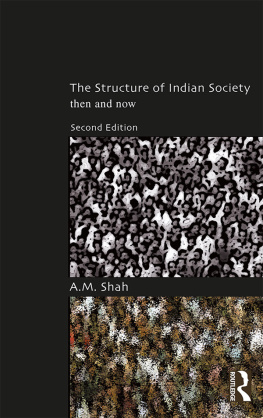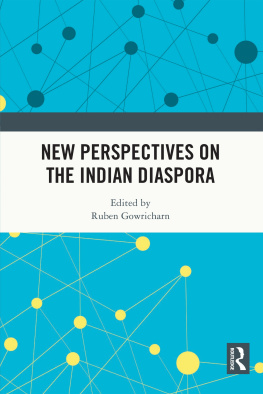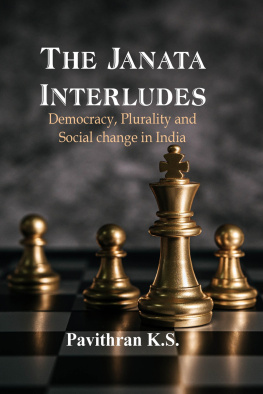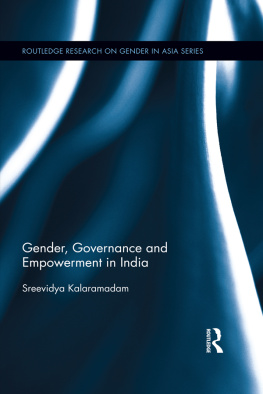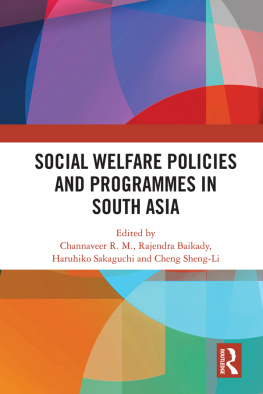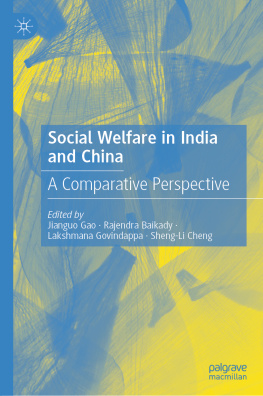Rethinking Contemporary
Indian Polity
Rethinking Contemporary
Indian Polity
Editor
Shalini Saxena

Vij Books India Pvt Ltd
New Delhi (India)
Published by
Vij Books India Pvt Ltd
(Publishers, Distributors & Importers)
2/19, Ansari Road
Delhi 110 002
Phones: 91-11-43596460, 91-11-47340674
e-mail:
web : www.vijbooks.com
First Published in India in 2018
Copyright 2018, Editor
ISBN: 978-93-88161-10-7 (Hardback)
ISBN: 978-93-88161-11-4 (ebook)
Price : 695/
All rights reserved.
No part of this book may be reproduced, stored in a retrieval system,
transmitted or utilized in any form or by any means, electronic, mechanical,
photocopying, recording or otherwise, without the prior permission of the
copyright owner. Application for such permission should be addressed to the
publisher.
The views expressed in this book are of the author in his personal capacity and
do not represent the views of the institution he belong to.

To my Mother Smt Indra Saxena
I miss you in every moment of my life.

T his book is designed to serve on the issues of contemporary political scenario for political scientists, political science students, research scholars, media persons and for the people who have interest in contemporary politics. This reference book talks about the recent developments of contemporary politics predominantly after 2014. This volume is divided into nine chapters and each chapter contemplates comprehensively on different aspects of existing political situation.
The introductory chapter on Rethinking Contemporary Indian Polity is contributed by the editor herself, which conveys an overall glimpse of present political situation specifically after 2014 when the new government under the able leadership of Prime Minister Shri Narendra Modi took charge.
Second chapter, which is contributed by Dr Jyotika Teckchandani, is Contemporary Government: Diaspora Policy. It is based on the present government diaspora policy. This chapter explores the changing meaning of diaspora and reflects upon the nature and features of Diaspora Policy of Prime Minister Modi and its impact on the changing perception about India in the world.
Chapter three Securing the Environment and promoting Gender Security is written by Mr V C Shushant Parashar. It gives gender based perspective on how security of the environment promotes gender security. This chapter also considers whether adequate options exist for women to participate to improve human security via environment security in the changing face of climate change in the recent times.
Chapter four Social Welfare Measures in Contemporary Indian Polity is contributed by Dr Nandini Sahay. This chapter presents a complete picture on the current governments social welfare schemes and programmes which cater to the needs of the weaker sections of the society including women, children, handicapped, aged, Scheduled Castes and Scheduled Tribes etc.
Chapter five is written by Dr Suresh Chandra Patel on Rethinking Indian Federalism: Issues and Challenges. It explains about the need of rethinking on the Indian federalism as the success of Indian democracy depends on the federal structure of India.
Sixth chapter is Situating India on the World Map: Indias Rise Narrative and Rethinking Cohens World Geopolitical Order, which is written by Ms Deblina Mukherjee, focuses on the geopolitical visions and world views, geopolitical code constructions and policy formulations by the strategic elite which gave India the new image from the 1990s onwards and in contemporary times.
Chapter seven which is on Maoist Movement and its Effect on Indian Political System is contributed by Ms Puspitarani Bardhan. This chapter narrates about the problem of Maoism and failure of the policy and plan meant for the development of the people of the country as the present NDA government also believes that the Maoist and Maoist problem need to be solved in the interest of the development of the people of India.
Chapter eight is National Security: Role of Energy in terms of Oil and Natural Gas: Future Prospects with reference to India is written by Mr. Rajneesh Kumar. It gives an overview on a comprehensive discipline encompassing not only the hard power but also the soft power in the form of various other politico-diplomatic and technological factors related to India as an independent politico-economic power to realize its national interests by practicing strong diplomacy in the present times.
The last chapter is on Local Democracy: Issues and challenges of economic development in south Asia is contributed by Dr Vadranam Suresh. It elucidates on Sustainable Development Goals (SDGs) with an increased focus on context specific and local economic development as a driver of poverty reduction, womens empowerment and inclusive growth with quality work the world over. This chapter gives a preview of present government policy to ensure that local economic development feature prominently in the strategy for implementing the new SDGs which promise to leave no one behind and ensuring effective and accountable government at all levels. Shri Narendra Modis slogan Sabka Saath, Sabka Vikas explains it all.
The book ends with the details of its contributors.
Dr Shalini Saxena.

I I would like to express my gratitude to the many people who saw me through this book; to all those who provided support, talked things over, read, wrote, offered comments, allowed me to quote their remarks and assisted in the editing, proofreading and designing of the book.
First of all, I would like to thank my father Shri Satish Chandra Saxena for his blessings. He always encouraged me to aim high. Above all I thank my husband Vivek, my kids Tathagat and Niranjani and my mother in law Dr Sudha Saxena, who supported and encouraged me despite all the time it took me away from them.
I would like to thank my brothers for facilitating me in the process of creating of this book.
Thanks to Mr Rohan Vij, my publisher who encouraged me.
My gratitude to Amity University, Noida, for providing me access to exposure and freedom to work.
Thanks to God, without his support this book would never find its way. Last but not the least, I seek forgiveness of all those who have been with me over the course of time and whose names I have failed to mention.
Dr. Shalini Saxena
Rethinking Contemporary Indian Polity
An Introduction

Dr. Shalini Saxena
I ndia was coxswained to a new government in 2014. This government has brought out many changes. On May 26, 2018 the government completed four years in power. Narendra Modi became the Prime Minister of India riding high on the aspirations and expectations of people, who waited for achhe din the slogan which propelled the Bharatiya Janata Party to become the first political party in 30 years to win a majority on its own in the Lok Sabha. Four years down the line, the current government faces serious challenges even as the BJP has been on an election winning spree.
Next page
